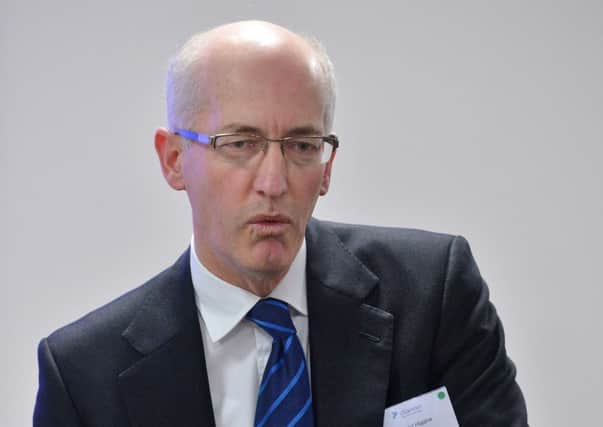Cities must work together to get benefits of high-speed rail


Speaking at the Yorkshire Post headquarters, Sir David Higgins told an audience of business and civic leaders that they must help themselves if they want to realise the benefits of high-speed rail.
He said that Greater Manchester sees itself as a big integrated commercial centre but Leeds, Bradford and Wakefield act as totally different cities with little in common.
Advertisement
Hide AdAdvertisement
Hide Ad“No-one here behaves as one big combined conurbation that all trades off each other,” he said.
“To get the most out of Government in transport planning, you have to do that. You have to help yourself. You must have your own plans. Manchester... it’s a case of holding them back.”
Sir David, the man who delivered the London Olympics on time and on budget, visited Leeds with the board of HS2 Ltd, the company responsible for developing and promoting the £50bn project linking London and the North.
He said: “It is damned obvious that London has got the lion’s share of money for the last 15 years at least on major projects for transportation and, of course, economic growth has followed.
Advertisement
Hide AdAdvertisement
Hide Ad“This must be a chance to rebalance. It must work for the North. It is a huge investment for the North. Having fought for it, you must as a group work together and work out what you want from it. Otherwise you won’t get it.”
Phase one of HS2 will run from London to Birmingham. Phase two will connect Birmingham to Manchester on the west side and Birmingham to Leeds on the east side, with intermediate stations in the East Midlands and Sheffield.
Sir David, who is preparing a review for the Government on the schedule and cost of the project, said the second stage must be “much more than HS2”.
“There must be a lot more done on connectivity. We need to get much more leverage out of the interchanges. We must have a plan for what happens at the same time in the control periods,” he said.
Advertisement
Hide AdAdvertisement
Hide AdControl periods cover five-year timespans for investment in railway infrastructure. As the outgoing chief executive of Network Rail, Sir David is finishing negotiations for the next five-year plan.
He said the two control periods covering 2020 to 2030 will be key to delivering improvements to wider transport connectivity in the second phase of HS2.
“We know from Europe that integrated transport is the key from Switzerland to Holland. It is how sophisticated countries work,” he said.
Sir David said transport hubs can be catalysts for regeneration, using the example of Stratford in East London, which is now home to one of Europe’s most successful shopping centres, Westfield. “That’s only because of public transport,” he said.
Advertisement
Hide AdAdvertisement
Hide AdSir David warned that some places benefited more than others following investment in transport.
“There are cities in France like Reims or Lille that have boomed because of high-speed rail and there are other cities like Tours that have done absolutely nothing.
“It is just a parkway halt with no advantage whatsoever because they have just sat back and said ‘high-speed rail is going to deliver a boom and we just need to sit and wait for it’ whereas other cities have said ‘it is coming in five or ten years’ time, we are going to have a clear business plan and get our act together’.”
Sir David said that Leeds needs to work out what it wants from the project and send its requirements to Government. The city council plans to commission a masterplan, working with the city region and HS2 Ltd.
Advertisement
Hide AdAdvertisement
Hide AdSir David said transport investment can help to address Britain’s “grossly unbalanced” economy with most regional cities underperforming in GDP per capita.
“My argument to all the politicians is we are all paying for that. It costs the economy and it costs the public. For me, reliable infrastructure, be it power or be it telecommunications or be it public transport, is central to that.”
Sir David faced questions from supporters and opponents of the HS2 project.